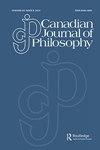The Political Philosophy of Data and AI
IF 1.7
2区 哲学
0 PHILOSOPHY
引用次数: 2
Abstract
We are increasingly subject to the power of technological systems relying on big data and AI. These systems are reshaping the welfare state and the administration of criminal justice. They are used to police tax evasion, track down child abusers, and model the spread of the pandemic. And they are used to weaponize vast surveillance networks through facial recognition technology. But algorithmic power extends far beyond the state: we spend ever more time working, socialising, and consuming within digital platforms. Our experiences are governed by algorithms that are constantly monitoring and shaping our behaviour and our attention, automatically selecting what we do and do not see. These online experiences have offline consequences, among them an unprecedented challenge to democratic processes worldwide.数据与人工智能的政治哲学
我们越来越受制于依赖大数据和人工智能的技术系统的力量。这些系统正在重塑福利国家和刑事司法。它们被用来监管逃税行为,追踪虐待儿童者,并模拟疫情的传播。它们被用来通过面部识别技术将庞大的监控网络武器化。但算法的力量远远超出了国家:我们花越来越多的时间在数字平台上工作、社交和消费。我们的经验由算法控制,这些算法不断监控和塑造我们的行为和注意力,自动选择我们做什么和不看什么。这些在线体验产生了线下后果,其中对世界各地的民主进程构成了前所未有的挑战。
本文章由计算机程序翻译,如有差异,请以英文原文为准。
求助全文
约1分钟内获得全文
求助全文

 求助内容:
求助内容: 应助结果提醒方式:
应助结果提醒方式:


